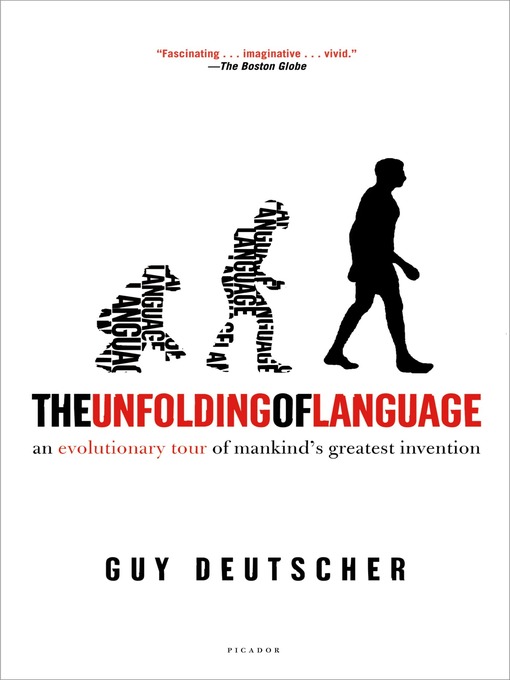Blending the spirit of Eats, Shoots & Leaves with the science of The Language Instinct, an original inquiry into the development of that most essential-and mysterious-of human creations: Language
"Language is mankind's greatest invention-except, of course, that it was never invented." So begins linguist Guy Deutscher's enthralling investigation into the genesis and evolution of language. If we started off with rudimentary utterances on the level of "man throw spear," how did we end up with sophisticated grammars, enormous vocabularies, and intricately nuanced degrees of meaning?
Drawing on recent groundbreaking discoveries in modern linguistics, Deutscher exposes the elusive forces of creation at work in human communication, giving us fresh insight into how language emerges, evolves, and decays. He traces the evolution of linguistic complexity from an early "Me Tarzan" stage to such elaborate single-word constructions as the Turkish sehirlilestiremediklerimizdensiniz ("you are one of those whom we couldn't turn into a town dweller"). Arguing that destruction and creation in language are intimately entwined, Deutscher shows how these processes are continuously in operation, generating new words, new structures, and new meanings.
As entertaining as it is erudite, The Unfolding of Language moves nimbly from ancient Babylonian to American idiom, from the central role of metaphor to the staggering triumph of design that is the Semitic verb, to tell the dramatic story and explain the genius behind a uniquely human faculty.
- Everyone Reads: Social Emotional Learning
- Lonely Planet Travel Guides
- Spotlight on: Mental Health
- Deaf Culture, Experience, and History
- Autism Awareness
- Employment and Career Resources
- Black Lives Matter - Books for Young People
- Celebrate National Native American Heritage
- Latinx Authors
- Anti-Racist Reading
- Schomburg Center Black Liberation Reading List
- Books to Battle Quarantine Sleep Problems
- Never, Never, Never Give Up
- See all useful topics collections
- eBooks with no wait lists!
- eBooks: Best 2022 Adult Fiction Titles
- Most popular
- Just Added
- Books in Spanish/Libros en Español
- SciFi Old & New, Contemporary & Classic
- Read-Along Books
- Popular Mysteries
- Try something different
- Why Wait? Always Available Classics
- Comics and Graphic Novels
- Escape into History: Historical fiction
- Manga for Grownups
- See all ebooks collections
- Always Available Audio
- It's Your Lucky Day! Audiobooks+
- eAudio: Best 2022 Adult Fiction Titles
- Modern Scholar Audiobooks - NO WAITING!
- Legacy Washington Audio Collection - Listen NOW!
- Most popular
- Just Added
- Spanish/Audiolibros en Español
- Stranger than Fiction
- Try something different
- Family Road Trip Audiobooks
- You can't hit pause on these thrillers
- Best Audiobooks under 3 Hours
- See all audiobooks collections
- 2023 Washington State Book Award Finalists (WSBA)
- Best of 2022: Adult Nonfiction
- Now's Your Chance!
- En español - lo nuestro
- Microhistories - Get down in the weeds with these intriguing titles!
- D-Day, June 6, 1944
- Unreliable Narrators
- Bibliotherapy
- Steampunk
- Dealing with Addiction
- Historical Fiction
- Presidents and Politics
- Laughing all the way to the bank
- See all eyes and ears collections



